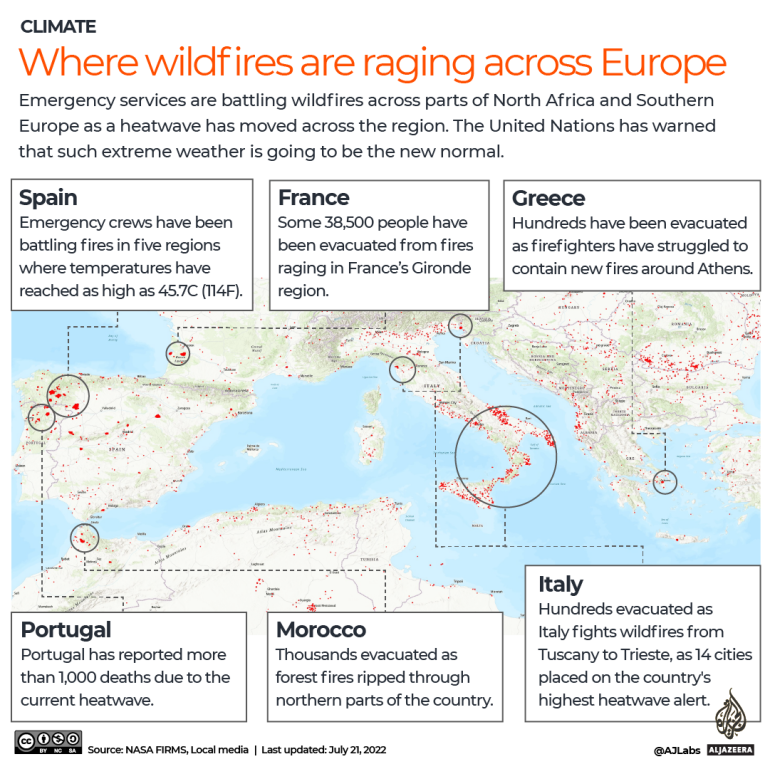As emergency services battle wildfires across Europe, we take a look at the event and the probable causes.
Once a rare occurrence, extreme fires are now becoming more frequent and lasting longer worldwide.
The destructive blazes are driven at least in part by climate change, which exacerbates their scale and intensity, even in the northern winter months.
With temperatures spiking above 40 degrees Celsius (104 degrees Fahrenheit), wildfires are raging across several countries in Europe, prompting mass evacuations.
Here is what you should know:
What has been happening?
- Wildfires are spreading across Europe as the combination of heatwaves and droughts are making it hard to combat the blazes in some regions.
- On Wednesday, emergency services battled wildfires across swathes of southern Europe amid mass evacuations. Temperatures cooled in France and the United Kingdom but firefighters continue battling wildfires in Greece, Spain and Italy.
- On Thursday, the European Forest Fire Information System said 19 countries were in “extreme danger” from the wildfires, while Spain, Portugal and France were at “very extreme danger”.
- In southwestern Slovenia, a severe wildfire was reported on Thursday in Kostanjevica na Krasu, a very dry and windy area.
What countries are affected?
- Wildfires have been raging in Greece, Portugal, Spain, Italy, Turkey, the United Kingdom and France.
- Greece: A wildfire in mountains near Athens, forced hundreds of people to flee; however, authorities said it was later brought under control.
- The wildfire broke out on Tuesday some 27km (16 miles) north of the capital and spread quickly to nearby urban districts, including Penteli and Anthousa.
- Despite taming the fire, some 485 firefighters, 120 fire engines and almost 20 aircraft remained to minimise the risk of flare-ups.
- In the meantime, more fires raged near the city of Megara, some 40km (25 miles) west of Athens and on the island of Salamina, a 15-minute ferry trip from the capital.
- Officials said that since the start of the fire season on May 1, they have recorded nearly 2,500 wildfires.
- Spain: Driven by a record-breaking heat wave, a fire that started last month in the province of Zamora scorched at least 25,000 hectares (61,000 acres). More than 6,000 people were evacuated from 32 villages in the area. Two people have died and three others were critically injured.
- Authorities say the situation is under control, but firefighters were also battling flames in the regions of Castile and Leon, Galicia, Aragon, Madrid and Castile-La Mancha, with some local services running out of fire extinguishing capacity.
- A blaze in the municipality of Ateca in the province of Zaragoza on Wednesday led to the suspension of all train services with Madrid, Aragon and Catalonia.
- Separately, according to authorities, more than 500 people died during a 10-day heatwave in Spain.
- Portugal: A wildfire started on July 17 in the Murca municipality, in northern Portugal and spread towards Vila Pouca de Aguiar and Carrazedo de Montenegro.
- The blaze has affected roughly 14,800 acres (5,989 hectares), according to the European Union’s Earth Observation Programme Copernicus. An elderly couple was found dead inside a burned car.
- Several wildfires also broke out on July 7 in the Leiria and Santarem districts, in the Ourem municipality.
- More than 7,413 hectares (18,318 acres) have burned and authorities have blocked key motorways and side streets as strong winds made it harder for firefighters to fight the flames.
- The country’s director-general of health said there were 1,063 heat-related deaths between July 7 and July 18.

- Italy: Firefighters on Wednesday battled for a second day to control a wildfire near the Tuscan town of Lucca.
- The blaze has already destroyed some 650 hectares (1606 acres) of woods.
- It also forced some 300 people to evacuate as the flames raged through the night, reaching some villages and causing some liquefied gas tanks to explode, governor Eugenio Giani said on Twitter.
- A blaze in northeast Italy spread to Slovenia and threatened to leave the city of Trieste without power and water.
- The country is forecast to endure temperatures of 48C (108F) from Wednesday through Friday.






